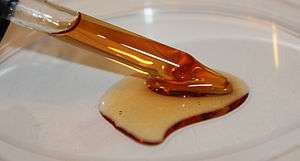''alpha''-Tocopherol
 | |
 | |
| Names | |
|---|---|
| IUPAC name
(2R)-2,5,7,8-Tetramethyl-2-[(4R,8R)-(4,8,12-trimethyltridecyl)]-6-chromanol | |
| Identifiers | |
| 3D model (JSmol) |
|
| ChEBI | |
| ChemSpider | |
| DrugBank | |
| ECHA InfoCard | 100.000.375 |
| EC Number | 200-412-2 |
| E number | E307a (antioxidants, ...) |
| PubChem CID |
|
| UNII | |
| |
| |
| Properties | |
| C29H50O2 | |
| Molar mass | 430.71 g/mol |
| Appearance | yellow-brown viscous liquid |
| Density | 0.950 g/cm3 |
| Melting point | 2.5 to 3.5 °C (36.5 to 38.3 °F; 275.6 to 276.6 K) |
| Boiling point | 200 to 220 °C (392 to 428 °F; 473 to 493 K) at 0.1 mmHg |
| Pharmacology | |
| A11HA03 (WHO) | |
| Hazards | |
| NFPA 704 | |
| Except where otherwise noted, data are given for materials in their standard state (at 25 °C [77 °F], 100 kPa). | |
| | |
| Infobox references | |
α-Tocopherol is a type of tocopherol or vitamin E. It has E number "E307".
α-Tocopherol is a form of vitamin E that is preferentially absorbed and accumulated in humans.[2] The measurement of "vitamin E" activity in international units (IU) was based on fertility enhancement by the prevention of spontaneous abortions in pregnant rats relative to alpha-tocopherol.
Stereoisomers of alpha-tocopherol
There are three stereocenters in alpha-tocopherol, so it is a chiral molecule.[3] The eight stereoisomers of alpha-tocopherol differ in the arrangement of groups around these stereocenters. In the image of RRR-alpha-tocopherol, all three stereocenters are in the R form. However, if the middle of the three stereocenters were changed (so the hydrogen was now pointing down and the methyl group pointing up), this would become the structure of RSR-alpha-tocopherol. RSR-alpha-tocopherol and RRR-alpha-tocopherol are diastereomers of each other. These stereoisomers can also be named in an alternative older nomenclature, where the stereocenters are either in the d or l form.[4]
1 IU of tocopherol is defined as ⅔ milligrams of RRR-alpha-tocopherol (formerly named d-alpha-tocopherol or sometimes ddd-alpha-tocopherol). 1 IU is also defined as 1 milligram of an equal mix of the eight stereoisomers, which is a racemic mixture called all-rac-alpha-tocopheryl acetate. This mix of stereoisomers is often called dl-alpha-tocopheryl acetate, even though it is more precisely dl,dl,dl-alpha-tocopheryl acetate). However, 1 IU of this racemic mixture is not now considered equivalent to 1 IU of natural (RRR) α-tocopherol, and the Institute of Medicine and the USDA now convert IU's of the racemic mixture to milligrams of equivalent RRR using 1 IU racemic mixture = 0.45 "milligrams α-tocopherol".[5]
References
- ↑ Merck Index, 11th Edition, 9931.
- ↑ Rigotti A (2007). "Absorption, transport, and tissue delivery of vitamin E". Mol. Aspects Med. 28 (5–6): 423–36. PMID 17320165. doi:10.1016/j.mam.2007.01.002.
- ↑ Jensen SK, Lauridsen C (2007). "Alpha-tocopherol stereoisomers". Vitam. Horm. 76: 281–308. PMID 17628178. doi:10.1016/S0083-6729(07)76010-7.
- ↑ Brigelius-Flohé R, Traber MG (1 July 1999). "Vitamin E: function and metabolism". FASEB J. 13 (10): 1145–55. PMID 10385606.
- ↑ "Composition of Foods Raw, Processed, Prepared USDA National Nutrient Database for Standard Reference, Release 20" (PDF). USDA. February 2008. Archived from the original (PDF) on 2012-02-19.
